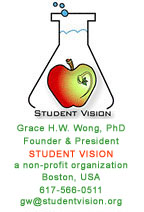|

|
 The best preparation for a scientist job search
The best preparation for a scientist job search
Nature Biotechnology 23, 265 (2005)
doi:10.1038/nbt0205-265
Grace
Wong, PhD
Grace H.W. Wong is chief scientific officer at ActoKine Therapeutics and president of Student Vision.
The
best preparation for a scientist job search
High-quality publications and established mentors are curriculum vitae
essentials for job-hunting scientists.
Landing a good job in scientific research is like climbing a mountain—you
need talent, a mix of skills, experience and a good plan to get to the
top. And like climbing a mountain, there are no shortcuts—if you do not
possess the talent, skills and experience that research organizations
or companies are looking for, no amount of networking or referrals will
get you hired.
Prior to entering the job market, it is essential to develop your scientific
skills and publish, as an indicator of your hard work and potential future
productivity. Select a good mentor with a strong record of publication
because they will be likely to publish with you.
The importance of publications
There is no substitute for high-quality publications in the eyes of recruiters,
and publication is vital to sustaining a competitive advantage during
your career. A good curriculum vitae (CV) with a solid record of publication
concisely encapsulates your skills, experience and potential, even to
a total stranger. Publishing a good paper is not a miracle. It is the
result of hard and determined work, good experimental design, and reproducible
results. Don't delay. The more publications you have, the better your
chances and prospects as a scientist.
Hiring managers, especially in the biotechnology and pharmaceutical industries,
put a great deal of emphasis on experience and practical skills in addition
to publications. A discovery that leads to a patent may carry more weight
than a journal publication. But, if your work bears fruit and you file
a patent or publish in high-quality journals, you will not need to look
for a job because jobs will come looking for you. Nothing succeeds like
success. Always keep in mind that there is no substitute for productivity,
as demonstrated by quality publications and patents.
Selecting good mentors
As high-quality publications emanate from high-quality laboratories, find
a good mentor in a well-equipped lab and surround yourself with smart
people you can collaborate with, who will challenge you and from whom
you can learn. Choose a mature mentor who is secure in his or her position,
so they can afford to let you take credit and give you the opportunity
to showcase your skills and accomplishments. David Goeddel, my mentor
at Genentech, was extremely accomplished and deliberately set up his lab
members to take credit for projects and to give presentations in his stead.
My other mentors include Sir Gus Nossal, who saw good things in everyone
and welcomed me into his famous immunology 'family'; John Schrader and
Ian Clark Lewis, who taught me about the beauty of cytokines, which will
remain with me for the rest of my life; Gordon Vehar, who advised me that
it was more important to produce a medicinal drug than to publish a paper;
Linus Pauling, who told me to speak up for my ideas and not to be afraid
to be different from everyone else; Silvano Fumero and Tim Wells, who
allowed me the freedom with which I was able to generate important data
for Serono; Jim Strickler and Steve Arkinstall, who appreciated out-of-the-box-thinking
and stuck their necks out, time and again, to protect me as I swam against
the current; Joost Oppenheim of NCI, who advised me that, "The all-important
serendipitous discoveries can be made only by those with an open and questioning
attitude"; and Claude G. Biava and Chip Allee of ActoKine, who taught
me how to transform basic science into life-saving drugs.
Be loyal to your mentors, and not just because you will eventually need
their recommendations in the future (though such recommendation can be
a major asset in your job search, particularly if your CV is a little
weak in spots). True mentors will support you throughout your career.
If your mentor is well known and respected, some of that will rub off
on you, by virtue of association. "Mentoring brings the best out of people
and helps their productivity," says Franz Hefti of Rinat Neuroscience.
"Without mentoring, a sink-or-swim environment evolves that wastes and
destroys human talent."
Academia versus industry
In general, academic scientists tend to do more basic research, whereas
scientists in industry focus on drug discovery and development. Martyn
Banks of Bristol-Myers Squibb says, "The major difference right now between
jobs in industry and academics is the greater autonomy in choice of research
topic for the latter. Also, industry is more applied in general than most
academics—it's drug development. Plus, in mature companies, chemists really
run the drug development process most places". And according to Rino Rappuoli
of Chiron, "In academia you can publish on any subjects which are trendy.
The paper is the ultimate goal of the work. In industry you can only work
on the problem you want to solve. The publication is not the end, but
the beginning of the real work."
So, if your interests match your organization's direction and you work
hard, with a little good fortune you will find success. "Cutting edge
science is a harsh profession and only a deep love of the topic and process
can get one through the daily tumbles," says Jeff Browning of Biogen Idec.
If you are good at what you do and valuable in your job, you will eventually
rise above. When you have creative ideas and get results, you also get
clout. This will not just happen—you have to work to earn it, no matter
whether you are in academia or in industry
|

